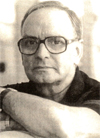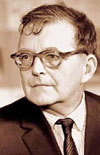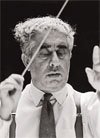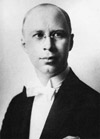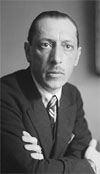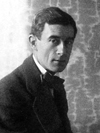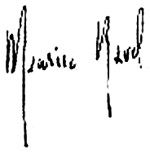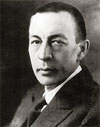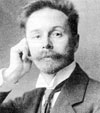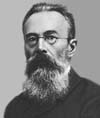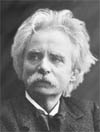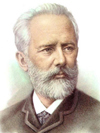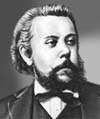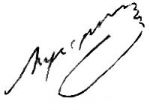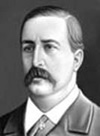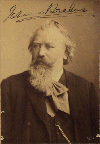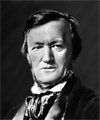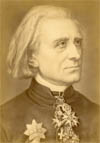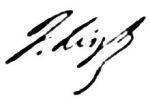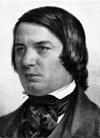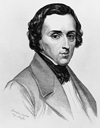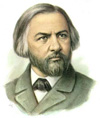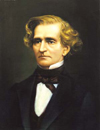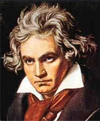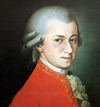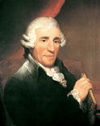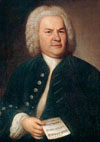Signatures of composers
Ennio Morricone
Born in 1928.
Italian composer, arranger and conductor. He wrote soundtracks for more than 400 movies and series. Winner of the Academy Award “for outstanding contribution into cinematograph”; as a composer he was nominated for the Academy Award 5 times. He also writes chamber instrumental music.
Dmitri Dmitrievich Shostakovich
(1906-1975)
Soviet composer, pianist, teacher and public figure, one of the largest composers of the XXth century, producing enormous influence on development of the modern music culture. The most prominent genres in his works were symphonies and string quartets. People’s Artist of the USSR (1954). Five time winner of the Stalin Prize.
Aram Ilyich Khachaturyan
(1903-1978)
Soviet composer, conductor, teacher, music and public figure. Since 1950 he taught composing in the Moscow Conservatoire and in the Gnesins Institute, since 1957 he was the Secretary of the USSR Composers’ Union. He also performed as a conductor with a lot of touring. People’s Artist of the USSR (1954).
Sergei Sergeyevich Prokofyev
(1891-1953)
Russian and Soviet composer, conductor, one of the most prominent composers of the XXth century. He started world touring in May 1918 and returned to Russia only in the mid 1930s. He taught in the Moscow Conservatoire. Work heritage of the composer includes opuses in various genres. People’s Artist of Russia (1947).
Igor Fyodorovich Stravinsky
(1882-1971)
Russian composer, conductor and pianist, one of the largest representatives of the world music culture of the XXth century. He actively toured Europe and the world as a conductor and pianist. Most of his life he lived as an emigrant.
Maurice Ravel
(1875-1937)
French composer, one of reformers and one of the most brilliant representatives of the world music culture of the XXth century. The most famous work in Bolero ballet created simultaneously with one of his most famous works – splendid orchestration of suite Pictures from Exhibition by M.P. Musorgsky. He toured a lot.
Sergei Vasilyevich Rakhmaninov
(1873-1943)
Russian composer, pianist and conductor, one of the most prominent representatives of the Russian music culture of the end of the XIXth – beginning of the XXth century. He created the new national style, later producing considerable influence on both Russian and world music of the XXth century.
Alexander Nikolayevich Skryabin
(1872-1915)
Russian composer and pianist, one of the brightest personalities of the Russian and world music culture. He was the first composer in history who used color music. He toured abroad a lot as a pianist and composer.
Nikolai Andreyevich Rimsky-Korsakov
(1844-1908)
Russian composer, teacher, conductor, public figure and musical critic. One of the most prominent representatives of “The Five” – creative fraternity of composers. Creative heritage of the composer includes operas, symphonies, symphonic opuses, instrumental orchestras, cantatas, chamber instrumental, vocal and spiritual music. As a teacher he raised about 200 composers, conductors and musicologists.
Edvard Grieg
(1843-1907)
Norwegian composer of the romanticism period, musical figure, pianist, conductor. He published about 125 songs and love songs; after the composer’s death about 20 more pieces were published. Lyric pieces form the major part of piano works of the composer. Today works of Edvard Grieg are highly esteemed, especially in his motherland – Norway.
Pyotr Ilyich Tchaikovsky
(1840-1893)
Russian composer, one of the best melodists, conductor, teacher, music and public figure. In 1866-1878 he was a professor of the Moscow Conservatoire (classes of free composing, theory, harmony and instrumentation). He skillfully coped with almost all music genres preferring operas, ballets and symphonies. He is a prominent figure of not only Russian by world culture.
Modest Petrovich Musorgsky
(1839-1881)
Russian composer, author of famous operas on topics of Russian history, member of “The Five”. He is one of innovators of the XIXth century, considerably outpacing his time and producing great influence on development of Russian and European music art. His works produced significant influence on composers of the XXth century.
Alexander Porfiryevich Borodin
(1833-1887)
Russian composer and chemist. He was a student and closest collaborator of outstanding chemist Nikolai Zinin, together with whom in 1868 he became a founding member of the Russian Chemical Society. Author of more than 40 works in chemistry. Musical heritage of Alexander Porfiryevich Borodin, combining scientific and teaching activities, is not large. He was a member of “The Five”.
Johannes Brahms
(1833-1897)
One of the most prominent German composers. Pianist, conductor. He wrote over eighty compositions. The composer was especially famous for his symphonies and the most outstanding work of Johannes Brahms, reflecting his creative power especially brilliantly, was “A German Requiem”.
Richard Wagner
(1813-1883)
German opera composer, conductor, playwright (author of librettos of his operas), philosopher, revolutionary. His works considerably influenced the European culture of the end of the XIXth-beginning of the XXth century, especially modernism. He paid a lot of time to ontological comprehension of music.
Ferenc Liszt
(1811-1886)
Composer, pianist, teacher, conductor, publicist, one of the most prominent representatives of romanticism in music. As a composer, he made a lot of inventions in the sphere of harmony, melodics, form; he created new instrumental genres (rhapsody, symphonic poem). Among his literary works there is a book about Frédéric Chopin, book about the music of Hungarians gypsies as well as a lot of articles dedicated to actual and global issues. Greatest pianist of the XIXth century.
Robert Schumann
(1810-1856)
German (Saxon) composer, pianist and conductor. Musical critic. One of the most famous composers of the first half of the XIXth century, representative of romanticism. Creative heritage of Robert Schumann is enormous.
Frédéric Chopin
(1810-1849)
Polish composer and pianist, he lived in France for a long time. Author of numerous works for piano and one of major composers in repertoire of many pianists. Since 1927 the Chopin International Contest ha been held in Warsaw.
Mikhail Ivanovich Glinka
(1804-1857)
Russian composer, father of Russian classical music. Hi heritage includes operas, symphonic compositions, chamber instrumental pieces, love songs and songs. Patriotic Song written by the composer was the official anthem of the Russian Federation in 1991-2000.
Hector Berlioz
(1803-1869)
French composer, conductor, music writer. Representative of romanticism, creator of the romantic program symphony. Together with Richard Wagner he placed foundation for the new conducting school and made an important contribution into development of the music critical ideas.
Ludwig van Beethoven
(1770-1827)
Great German composer, pianist and conductor. The younger of the Vienna classics. The most prominent in his heritage are: instrumental pieces, piano, violin and cello sonatas, piano and violin concertos, as well as quartets, overtures and symphonies.
Wolfgang Amadeus Mozart
(1756-1791)
Austrian composer, instrumentalist and conductor. Prominent representative of the Vienna classic composition school. He was also a virtuosic violinist, harpsichordist and organist. According to his contemporary he possessed phenomenal ear for music, musical memory and improvisational ability.
Joseph Haydn
(1732-1809)
Great Austrian composer, representative of the Vienna classical school, one of founders of such music genres as symphony and string quartet. The composer’s heritage includes symphonies, quartets, piano sonatas, oratorios, masses and operas.
Johann Sebastian Bach
(1685-1750)
German composer and organist, representative of the baroque epoch. One of the most prominent composers in music history, during his life he wrote more than 1000 compositions. His works include all significant genres of that time except opera. He summarized achievements of baroque music. Works of Johann Sebastian Bach influenced works of composers of the XIX-XXth centuries.
For the largest part ill handwriting in the world is caused by hurry.
(Lewis Carroll)
